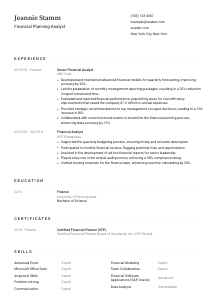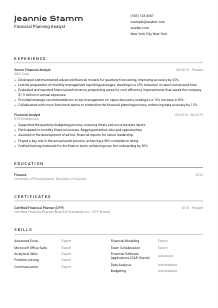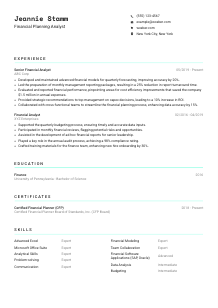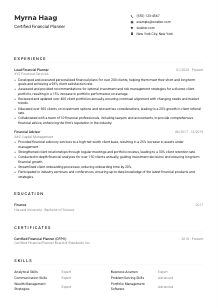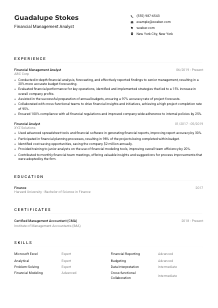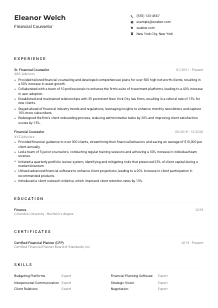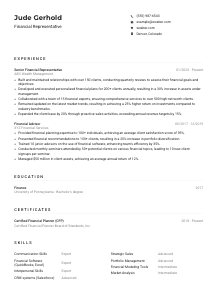Financial Planning Analyst Resume Example
Balancing budgets, but your resume looks bankrupt? Dive into this Financial Planning Analyst resume example, built using Wozber free resume builder. Discover how you can synthesize your fiscal foresight with job prerequisites, paving the way towards a career that's as financially fulfilling as your strategies!
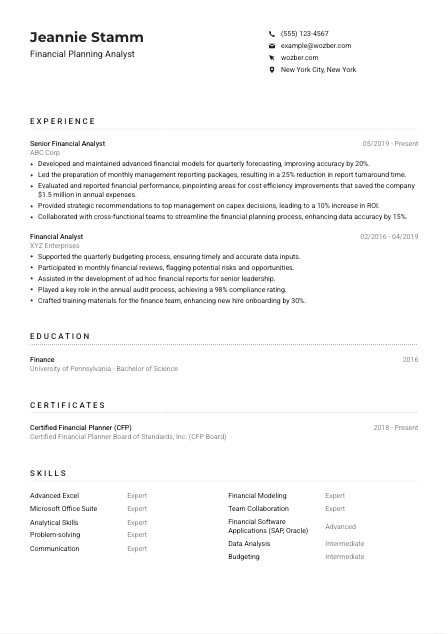
How to write a Financial Planning Analyst resume?
Welcome you, future financial guru! In the fast-paced world of finance, carving out a niche for yourself starts with one crucial document: your resume. It's not simply a piece of paper — it's a strategic tool, showcasing your arsenal of skills, experiences, and education tailored to leap off the page.
Here, with the help of Wozber's free resume builder, we're diving deep into how to make your Financial Planning Analyst resume not only meet the job specs but exceed them, especially for those critical eyeballs - both human and the automated ones scanning via Applicant Tracking Systems (ATS). Get ready to match your masterful financial planning skills with an equally impressive resume!
Personal Details
Think of the Personal Details section as the 'hello' before the handshake. Getting it right sets a professional tone for the rest of your Financial Planning Analyst resume. Follow these curated steps, ensuring your introduction resonates with the exactitude of a well-calculated financial forecast.
1. Name with Fame
Begin with clarity. Your name, the headline of your personal brand, should be prominent. Reflect on its placement like choosing a stock; it should stand out with potential for high returns (re: attention from hiring managers!).
2. Job Title Precision
Here's where ATS optimization first comes into play. Use the term 'Financial Planning Analyst' exactly as it appears in the job description. This simple step automatically aligns your resume more closely with the job and signals to the ATS you're a relevant candidate.
3. Contact Info: Make it Count
Ensure your phone and professional email (yes, firstname.lastname@gmail is perfect) are incorrect format - an easily overlooked detail that can disqualify you before the game has even begun. Double-check, always.
4. Location, Location, Location
Mentioning 'New York City, New York' isn't just about geography; it's strategic positioning. It immediately informs the hiring manager you're ready for the role without the logistics of relocation, closing the distance between you and your next job.
5. Digital Footprint
Adding a LinkedIn URL or personal finance blog can add depth to your application, providing a richer picture of your professionalism and expertise. Ensure they are polished and mirror the professionalism of your resume.
Takeaway
Craft this section with the precision of balancing a portfolio. Make it compelling, professional, and aligned with the Financial Planning Analyst role. With the right introduction, you're one step closer to seizing the attention your expertise deserves.





Experience
The Experience section is where you demonstrate you're not just a candidate, but the candidate. Here's how to strategically outline your career path, peppering it with achievements that scream Financial Planning Analyst material. Let's ensure your experience speaks the language of success.
- Developed and maintained advanced financial models for quarterly forecasting, improving accuracy by 20%.
- Led the preparation of monthly management reporting packages, resulting in a 25% reduction in report turnaround time.
- Evaluated and reported financial performance, pinpointing areas for cost efficiency improvements that saved the company $1.5 million in annual expenses.
- Provided strategic recommendations to top management on capex decisions, leading to a 10% increase in ROI.
- Collaborated with cross‑functional teams to streamline the financial planning process, enhancing data accuracy by 15%.
- Supported the quarterly budgeting process, ensuring timely and accurate data inputs.
- Participated in monthly financial reviews, flagging potential risks and opportunities.
- Assisted in the development of ad hoc financial reports for senior leadership.
- Played a key role in the annual audit process, achieving a 98% compliance rating.
- Crafted training materials for the finance team, enhancing new hire onboarding by 30%.
1. Map the Terrain
First, turn the job requirements into your cheat sheet. Duties like 'develop and maintain financial models' or 'collaborate with cross-functional teams' should be reflected in your achievements, forming a mirror image of what they seek.
2. Company, Position, Duration - The Golden Trio
List each role in reverse-chronological order, starting with your current or most recent job. This layout not only satisfies the ATS but gives hiring managers a clear, immediate view of your upward trajectory in finance.
3. Accomplishments Over Tasks
Focus on what you've achieved, not just what you've done. Quantify your results whenever possible to give concrete evidence of your capabilities, like 'improved forecasting accuracy by 20% or saved company $1.5 million in annual expenses.'
4. The Numbers Game
Finance thrives on quantification, and so should your resume. From percentage improvements to dollars saved, specific figures give a tangible, compelling narrative to your career story, showing you understand the true language of business: numbers.
5. Relevancy is King
Keep it focused. Like constructing a meticulous financial model, each point should serve a purpose, directly correlating with the job's requirements. Extraneous details are just noise, diluting the potency of your experience.
Takeaway
Imagine you're presenting a case for an investment; let your experience section be the compelling argument that you're the asset they need to grow. Detail, quantify, and tailor, ensuring every sentence reaffirms your strength as a Financial Planning Analyst.
Education
Your educational background is the bedrock of your Financial Planning Analyst persona. Even here, attention to detail matters. Let's tailor this section to reflect not just your qualifications but how they make you a precise fit for this role.
1. Identify the Nexus
The job calls for a 'Bachelor's degree in Finance, Accounting, or a related field.' If your degree aligns, great! If it's related, that's your cue to make a strong supporting argument for its relevance.
2. Structure Matters
Keep the formatting clean and straightforward: degree first, followed by field, institution, and graduation year. This clarity helps both the hiring manager and ATS quickly verify one of the primary qualifications.
3. Degree Alignment
Your 'Bachelor of Science in Finance' isn't just a degree; it's a badge of honor proving your preparation for this exact role. Position it as such, emphasizing its direct relevance to the Financial Planning Analyst position.
4. Beyond the Degree
Did you specialize in financial modeling or take elective courses in advanced Excel? Mentioning these can bolster your education section, offering concrete proof of your expertise and readiness for the nuances of the role.
5. Other Laurels
Honors, recognitions, or related extracurricular involvements during your academic tenure can speak volumes about your dedication and capabilities. However, weigh their relevance against the seniority level of the job before including.
Takeaway
Your Education section should read like a clear, concise statement of your readiness for the Financial Planning Analyst role. Each entry is a chapter in your story of preparation and dedication to your profession. Craft it well.
Certificates
In the world of finance, staying updated is not optional; it's necessary. Your certificate section is a powerful opportunity to show you're on top of industry trends and standards. Let's make the most of this space, enhancing your resume's appeal.
1. Matchmake with Job Requirements
Our targeted job highlights 'Certified Financial Planner (CFP) or Chartered Financial Analyst (CFA) designation is a plus.' If you're the proud holder of either, you've struck gold. These are not just certifications; they're direct tickets to the top of the resume pile.
2. Quality Over Quantity
Resist the urge to list every certificate you've ever earned. The goal is to highlight those most relevant and recent, especially if they're directly recognized as value-adds by the job description. This selective strategy makes your resume more potent.
3. Timing is Everything
Especially for certifications with expiration dates or those recently acquired, include the time frame. It shows you're not only qualified but also actively engaged in maintaining and expanding your expertise.
4. Keep the Cycle Going
In finance, the landscape is always shifting. Staying certified, pursuing further endorsements, and continually learning are part of demonstrating your dedication to excellence and adaptability in your field.
Takeaway
This section is a testament to your ongoing quest for knowledge and excellence. Each certificate is a building block in your career, reinforcing your suitability and dedication to the Financial Planning Analyst role. Select wisely, present proudly.
Skills
Skills are the currency of your profession, and your resume needs to showcase you're rich in those demanded by your dream job. Here's how to tailor this section to highlight your most marketable financial planning skills in alignment with ATS and hiring manager expectations.
1. Decode the Blueprint
The job description is your treasure map. Skills like 'advanced Excel skills,' 'analytical,' and 'problem-solving' are your X marks the spot. Place these skills prominently to ensure ATS algorithms and hiring managers see you're equipped with the essential tools.
2. Prioritize for Impact
List skills that have direct applications to the tasks outlined in the job description. Your prowess in 'financial modeling' and 'Microsoft Office Suite' isn't just impressive; it's exactly what they're looking for. This alignment ensures a compelling match.
3. Clear and Structured
A cluttered skills section can be as confusing as a complex balance sheet. Keep your list organized and focused, ensuring each skill is relevant and underscores your capability for the Financial Planning Analyst position.
Takeaway
Like a well-diversified portfolio, your skills section should balance hard and soft skills pertinent to a Financial Planning Analyst. Each listed skill is a pledge of your professional value. Curate with care, showcase with confidence.
Languages
In the interconnected world of finance, language skills can differentiate you as a versatile and adaptable candidate. While the job might specify 'English necessary,' possessing additional language skills can be a considerable asset. Here's how to highlight your linguistic talents.
1. Speak Their Language
When the job calls for 'Strong ability to communicate in English,' it's non-negotiable. Listing 'English: Native' directly addresses this requirement, setting a solid foundation for your application.
2. Extra Lingual Leverage
If you can bring more to the table with additional languages, do so. Being 'Fluent in Spanish,' for instance, not only shows you're a candidate of diverse abilities but also readies you for roles involving broader markets or international clients.
3. Honesty in Proficiency
While it's tempting to embellish, clear and honest indications of your language skills are vital. Accurately depicting your level ensures expectations are met, and your integrity remains intact.
4. Tailor to the Role
For positions that hint at global interactions or diverse team collaboration, highlighting your multilingual abilities can significantly bolster your candidacy. Although not expressly demanded for our Financial Planning Analyst role, it's a valuable add-on.
5. A Window to Culture
Beyond mere communication, language skills suggest an openness and adaptability to different cultures and practices, an increasingly valuable asset in the globalized world of finance.
Takeaway
Your linguistic skills reflect an ability to bridge cultures and markets, a prized trait in the financial sector. Whether it's a requirement or a bonus, proudly showcase your languages as a key part of your professional identity.
Summary
Your summary is the elevator pitch of your resume, a chance to grip the reader's attention and make them eager to dive deeper. For a Financial Planning Analyst position, it's about striking a balance between showcasing your skills and capturing your professional essence. Let's craft a summary that packs a punch.
1. Grasp the Job's Heart
Begin by synthesizing the job's core requirements. A Financial Planning Analyst must have a strong analytical ability, expert Excel skills, and a knack for forecasting and budgeting. Weave these elements into your summary.
2. A Professional Snapshot
Introduce yourself as a finance professional with tangible successes to your name. Highlight your 'over 6 years of experience in financial modeling, reporting, and collaboration,' immediately establishing your track record.
3. Your Unique Contribution
Blend in your accomplishments, such as 'recognized for saving millions through cost efficiencies and enhancing financial processes.' This specificity shows not just ability, but impact — a winning combination.
4. Brevity is Key
Your summary is just the appetizer, meant to entice and intrigue. Craft it as a succinct teaser of your capabilities and experiences, leaving the reader hungry to learn more about you.
Takeaway
Your summary isn't just an introduction; it's your first impression, your chance to assert you're the perfect fit for the Financial Planning Analyst role. Make every word count, and set the stage for your resume to do the heavy lifting.
Launching Your Financial Planning Analyst Journey
You've now navigated the intricacies of tailoring your resume for a Financial Planning Analyst position, equipped with strategies to charm both ATS and human reviewers. Remember, your resume is more than a document; it's your professional narrative, told in the language of finance and shaped with precision. Use Wozber's free resume builder to bring these insights into action, benefiting from an ATS-friendly resume template and optimizing with an ATS resume scanner.
This is your moment to shine — begin crafting your story, and let it open doors to the opportunities awaiting you in the vast world of finance. Go ahead, make your mark!

- Bachelor's degree in Finance, Accounting, or a related field.
- Minimum of 3 years of experience in financial planning, analysis, or related field.
- Proficiency in financial software applications and Microsoft Office Suite, with advanced Excel skills.
- Strong analytical, problem-solving, and communication skills.
- Certified Financial Planner (CFP) or Chartered Financial Analyst (CFA) designation is a plus.
- Strong ability to communicate in English necessary.
- Must be located in or willing to relocate to New York City, New York.
- Develop and maintain financial models for forecasting, budgeting, and scenario analysis.
- Assist in the preparation of management reporting packages and presentations.
- Evaluate financial performance by comparing actual results with forecasts and budget variances.
- Provide recommendations to management on financial decisions and cost-efficiency improvements.
- Collaborate with cross-functional teams to drive financial process improvements and ensure data accuracy.





